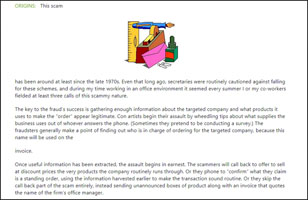Office Supply Scams
The trick performed by fraudulent suppliers:
Scams take many forms to pull your money and personal information, leaving you stranded with empty pockets. Scammers often target students, house insiders, and the aged, but one fraternity that is more vulnerable to the bogus tricks played by conmen is business groups, particularly small and startup businesses. Office supply scams are one such small business targeting scam that is carried out by creating confusion over product invoices and goods, making the organization pay for the goods that have not been ordered or pay more than the agreed bid. These supply scammers often work in a boiler room, a temporary office set up that consists of desks and telephones that can be dismantled easily.
Fraudulent suppliers employ various tricks to deceive businesses. One common tactic involves impersonation, where scammers mimic reputable companies to gain trust. They may offer attractive prices for high-quality products, only to deliver substandard items in a classic bait-and-switch maneuver. Overcharging is another ploy, exploiting buyers' lack of market knowledge by presenting inflated quotes or invoices. False documentation, such as certificates or compliance proofs, adds a layer of deception. Scammers often create urgency using pressure tactics, pushing for immediate payment or claiming limited-time offers. Additionally, they may send false invoices for unordered goods, relying on the recipient's oversight. To counter these tricks, businesses should verify supplier information, use established procurement channels, scrutinize invoices, and educate employees on recognizing and reporting suspicious activity.

Operates this way:
The office supply scam starts by calling an employee of a company and making him believe that an order for office supplies has been made by the purchase control team. If the scammer finds that the employee trusts him, he continues to develop the conversation and take advantage of holes in the organization's purchasing procedures and gets the firm peddled with overpriced, poor-quality goods or never ordered items. These office supply phone scams usually revolve around three major scenarios: the fake invoice scams, the extra payment scams, and gift horse scams.
Fraudulent suppliers operate by employing deceptive tactics to exploit businesses and individuals. They often begin by impersonating reputable companies, using similar names and logos to establish a facade of legitimacy. The bait-and-switch technique involves advertising appealing products at attractive prices but delivering subpar or different items upon payment. Overcharging schemes rely on presenting inflated quotes or invoices, taking advantage of buyers' limited market knowledge. False documentation, such as forged certificates, adds a layer of deception. Scammers create urgency through pressure tactics, demanding immediate payments or offering purported limited-time deals. Additionally, they may send false invoices for goods never ordered, banking on recipients' oversight. To safeguard against these tactics, businesses must verify supplier information, use established procurement channels, scrutinize invoices, and educate employees to recognize and report fraudulent activity promptly.

Fake invoice scams:
Claiming to be the regular supplier, the supply scammers approach the employee, telling that the accounts department of his firm has lost the details of their company and purchase order information. Throughout the conversation, these sham operators will be keen on deploying information about the person talking on the other side, in addition to the details of the company. If the worker gets convinced and gives his details like name, employee ID, etc., with the company's address, the scammers will prepare a fake invoice and send it to the company. In worst cases, these fraudsters will mention the name of the person, whom they have spoken with, in the place of "authorized buyer" on the invoice slip, making him answerable to the company on unordered merchandise. Fake invoice scams involve the issuance of deceptive invoices to trick businesses into making payments for non-existent goods or services. Scammers often mimic legitimate invoices, utilizing convincing details to deceive victims. This may include falsified company information, logos, and itemized lists. Tactics involve impersonating existing suppliers or creating fictitious entities. To guard against fake invoice scams, businesses should implement rigorous verification processes, scrutinize incoming invoices for irregularities, and educate employees on recognizing and reporting potential fraudulent activities. Vigilance and awareness are crucial to thwarting these deceptive practices.

Extra payment scams:
Gift-horse scams:
Ways to avoid office supply scams:





